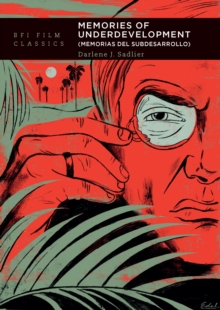Description
| Product ID: | 9781839024979 |
| Product Form: | Paperback / softback |
| Country of Manufacture: | GB |
| Series: | BFI Film Classics |
| Title: | Memories of Underdevelopment |
| Subtitle: | Memorias del Subdesarrollo |
| Authors: | Author: Darlene J. Sadlier |
| Page Count: | 104 |
| Subjects: | Films, cinema, Films, cinema, Film history, theory or criticism, Film theory & criticism, Cuba, Latin America |
| Description: | Select Guide Rating Tomás Gutiérrez Alea’s Memories of Underdevelopment (1968) is a classic of Cuban revolutionary culture, and is hailed as a prime example of a radical style of 1960s political filmmaking that became known worldwide as Latin American “new cinema.” Darlene J. Sadlier’s detailed study approaches this much-written-about film from a new perspective. Her analysis situates the film in its historical context, considering how Cuban political history affected and informed the production of the film, particularly its use of archival footage. She discusses the film as an adaptation of Edmundo Desnoes’s novel Memorias del subdesarrollo (1965), exploring how the novel itself is “re-written” in significant ways by the film. Sadlier goes on to analyse the curious opening of the film on an outdoor scene of Afro-Cubans dancing to the “new” music of Pello del Afrokán, arguing that this opening scene prefaces the film’s exploration of both class and race. She focuses on the unique style of the film, particularly the use of voiceover, music and documentary footage to show how the themes of ennui, isolation, writing, and remembering are depicted. In doing so, she highlights the film’s lasting impact and its role in defining Latin American “new cinema”. Tomás Gutiérrez Alea’s Memories of Underdevelopment (1968) is a classic of Cuban revolutionary culture, and is hailed as a prime example of a radical style of 1960s political filmmaking that became known worldwide as Latin American “new cinema.†Darlene J. Sadlier’s detailed study approaches this much-written-about film from a new perspective. Her analysis situates the film in its historical context, considering how Cuban political history affected and informed the production of the film, particularly its use of archival footage. She discusses the film as an adaptation of Edmundo Desnoes’s novel Memorias del subdesarrollo (1965), exploring how the novel itself is “re-written†in significant ways by the film. Sadlier goes on to analyse the curious opening of the film on an outdoor scene of Afro-Cubans dancing to the “new†music of Pello del Afrokán, arguing that this opening scene prefaces the film’s exploration of both class and race. She focuses on the unique style of the film, particularly the use of voiceover, music and documentary footage to show how the themes of ennui, isolation, writing, and remembering are depicted. In doing so, she highlights the film’s lasting impact and its role in defining Latin American “new cinemaâ€. |
| Imprint Name: | BFI Publishing |
| Publisher Name: | Bloomsbury Publishing PLC |
| Country of Publication: | GB |
| Publishing Date: | 2023-04-20 |


